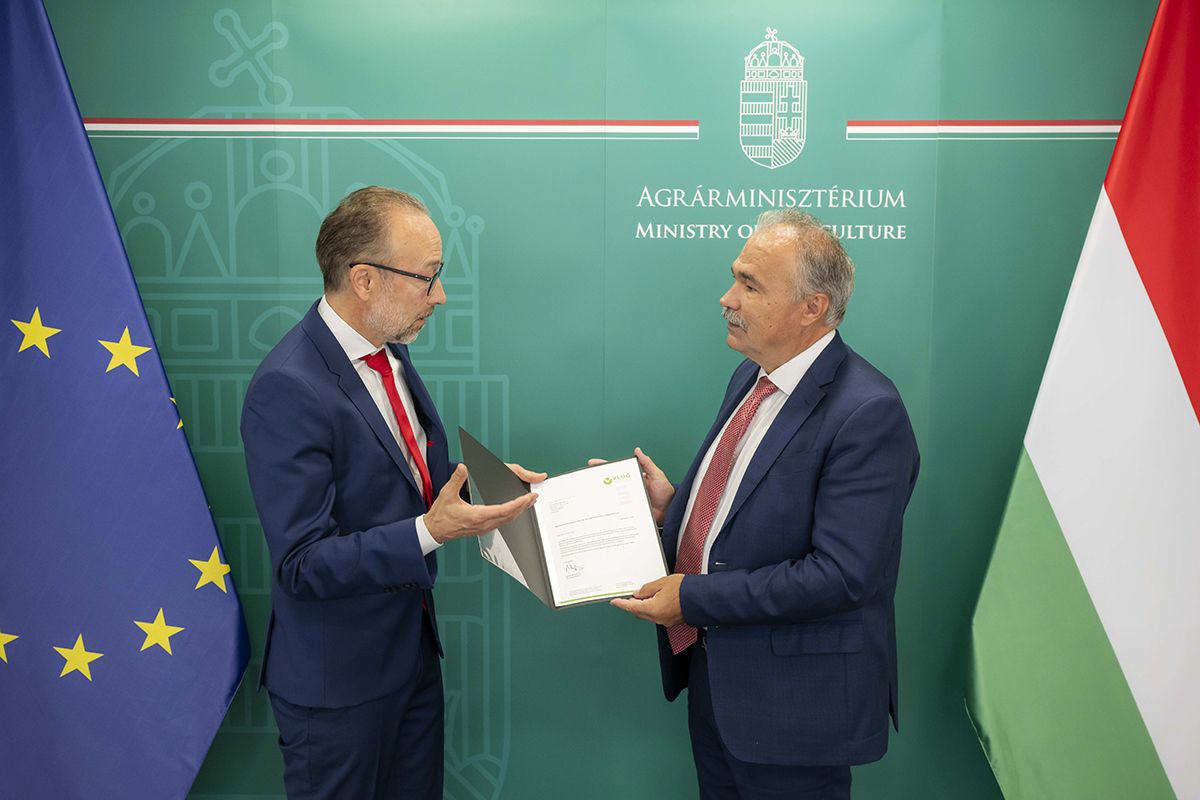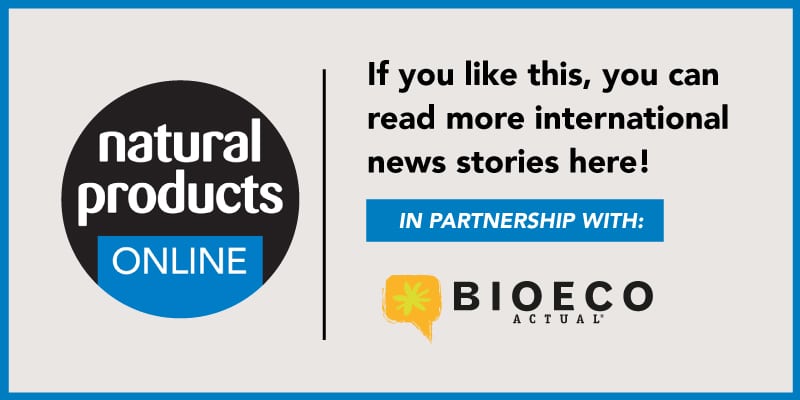Dr István Nagy, current EU Council President for Agriculture and Fisheries, met with representatives of a business initiative to submit an Open Letter ‘Food Industry for Freedom of Choice’. 376 businesses from the food industry in 16 EU Member States have signed the letter. Among them are renowned industry giants as the REWE Group, the third largest food retailer in the EU, the leading retailer in Austria, SPAR Austria, Europe’s largest drugstore chain dm-drogerie markt, and the world’s largest organic supermarket chain Biocoop. Across Europe, companies see their entrepreneurial freedom threatened by the EU Commission’s plans to deregulate so-called new genomic techniques (NGTs) or new GMOs. They are therefore appealing to the EU Agriculture Council to stand up for transparency, freedom of choice and fair competitive conditions along the entire value chain.
On behalf of the signatory companies, Gunther Weiss, Head of Quality Management at Alnatura, personally handed over the Open Letter to the Minister. Weiss and Alexander Hissting, Managing Director of the Association Food without Genetic Engineering (Verband Lebensmittel ohne Gentechnik,VLOG), conveyed the concerns of the industry initiative during the meeting. Minister Nagy was very positive about the open letter. At the handover he expressed his thanks for the initiative and in the discussion which followed he showed his support for the companies’ demands, saying that he could understand the concerns and was fully behind the demands. The letter was sent to the other EU agriculture ministers at the same time.
Demands: Labelling, traceability, coexistence and liability rules
The companies welcome the EU Parliament’s call for mandatory labelling and traceability for all products produced with new GMOs (or NGTs) and call on the Agriculture Council to support this position. However, additional far-reaching measures are necessary in order to continue to be able to produce ‘without genetic engineering’ and guarantee freedom of choice, as well as to ensure fair competition in the European food industry. In addition to mandatory labelling and traceability, the signatories are also calling for reliable detection methods, EU-wide compulsory, nationally and regionally adapted coexistence measures, liability rules in accordance with the polluter-pays principle and a compensation fund for unavoidable contamination.
The open letter’s timing is pertinent. The EU agriculture ministers have not yet been able to agree on a common position on the EU Commission’s deregulation plans. Only once this has happened the trilogue between Commission, Council and European Parliament can start in order to negotiate a new EU law on NGTs.
On behalf of all signatories, senior representatives from the European food industry make clear in their statements the consequences a new regulation in the planned form would have for their companies and for consumers and what demands they are making.
Kerstin Erbe, dm-drogeriemarkt, Managing Director Product Management and Environmental Sustainability: “Our corporate culture commits us to offering natural and healthy products as well as comprehensive and clear information about these products to the people in Germany and in 13 other European countries where we operate dm stores. Citizens must be able to obtain information as much as possible about what they are consuming.”
Ulrich Zuenelli, A. Loacker AG, Managing Director: “Our products are in demand worldwide. Many importing countries demand transparency about the use of genetic engineering, including NGTs. If we don’t know what we use in our products, we can no longer fulfil the requirements of our business partners and risk losing important export markets. To ensure GMO-free supply chains, we are calling for mandatory labelling and coexistence measures.”
Prof Dr Götz E. Rehn, Alnatura founder and CEO: “The same applies to the new genetic engineering: customers want to be free to choose whether or not they want this technology on their plates. This requires clear rules on coexistence in agriculture, complete transparency and a declaration on all products.”
Markus Kaser, SPAR Austria, Board Member: “Without mandatory labelling of any genetic engineering in food, there is no transparency and therefore no freedom of choice on SPAR shelves. We are not against technical progress per se, but in favour of customers’ freedom of choice.”
Heinz Kaiser, Schwarzwaldmilch, Head of Agriculture/Production/Logistics: “As a medium-sized dairy, we have been working with our more than 800 dairy farmers for decades to ensure that our product range is GMO-free. The EU Commission’s deregulation plans are a threat to our existence because they jeopardise the coexistence of production systems ‘with and without genetic engineering’. We need compulsory national and regionally adapted coexistence measures to ensure fair competition.”
Fréderic Faure, Biocoop, Vice President: “Since the introduction of genetic engineering, Biocoop has been opposed to this technology and the resulting products. Our standards prohibit all suppliers from using GMOs. Biocoop recognises a number of hazards of ‘old’ genetic engineering (GMO) and ‘new’ genetic engineering (NGT), including patentability, additional dependence of farmers on the seed and pesticide industry, outcrossing into the environment and the resulting negative impact on biodiversity. We call for EU NGT regulations that protect life.”
The open letter is an initiative of the German manufacturers Alb-Gold Teigwaren GmbH, Alnatura Produktions- und Handels GmbH, Andechser Molkerei Scheitz GmbH, Milchwerke Berchtesgadener Land Chiemgau eG, dm-drogerie markt GmbH + Co KG, Frosta Tiefkühlkost GmbH. Supporters: (German) Association Food without Genetic Engineering (VLOG), European Non-GMO Industry Association (ENGA), organic farming association Bioland, Association of Organic Food Producers (AöL), Bundesverband Naturkost Naturwaren (BNN).
Background information
In the summer of 2023, the EU Commission presented its draft revision of genetic engineering legislation with a far-reaching abolition of risk assessment and labelling requirements for new genetic engineering (NGT) products. According to the draft, almost all genetically modified plants are to be treated in the same way as conventionally bred plants and are to be no longer labelled as genetically modified (GM). The deregulation plans would obliterate the freedom of choice and have met with the disapproval of many consumers. On the part of the food industry, the draft law has caused great concern and much criticism. The organic and non-GMO industries in particular feel that their very existence is at risk and have expressed this in the Open Letter.
The article Hungary’s Agriculture Minister Dr István Nagy accepts Food Industry Open Letter European enterprises call for rigorous labelling of NGTs appeared first on Bio Eco Actual.





